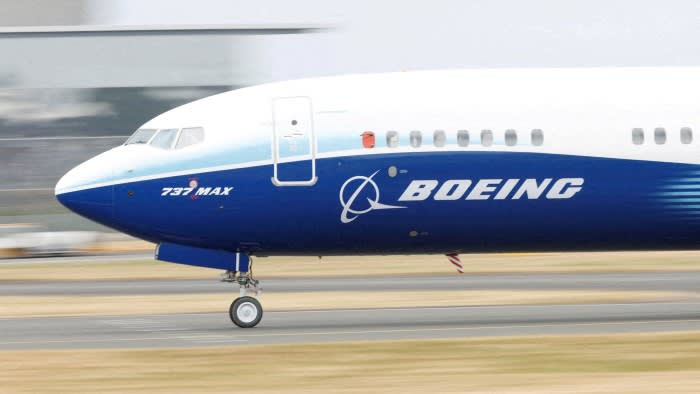
Unlock the Editor’s Digest for free
Roula Khalaf, Editor of the FT, selects her favourite stories in this weekly newsletter.
Boeing has warned that it will burn more cash in the first quarter than previously expected as the US jet maker grapples with the consequences of the blowout of a door panel in mid-flight from one of its aircraft.
Chief financial officer Brian West said cash outflow would reach $4bn-$4.5bn in the first quarter, higher than forecast in January. A plan to reach a $10bn cash flow target by 2025-26 would also take longer, West told a Bank of America conference in London on Wednesday.
Boeing has had to limit production of its 737 Max aircraft in the wake of its latest crisis as it seeks to improve the quality of its manufacturing and deal with increased regulatory scrutiny. The company in January suspended its financial guidance for 2024 after the incident.
“We’re not at the moment where we can manage the near-term for these financial outcomes because of the work at hand around stability,” West said. “Our expectation is that we’ll get more predictable and better positioned, but it will take time.”
For the year, Boeing’s free cash flow will be in the “single-digit billions of dollars,” West said. The company reported $4.4bn of free cash flow in fiscal 2023.
Boeing shares were down 0.2 per cent after Wall Street’s opening bell on Wednesday. The stock is down almost 30 per cent since the start of the year.
The door panel incident has renewed scrutiny over the quality of Boeing’s safety culture and manufacturing control. A Boeing 737 Max 9 aircraft operated by Alaska Airlines lost a door panel at an altitude of 16,000 feet after it had taken off from Portland, Oregon, on January 5.
A preliminary investigation by the National Transportation Safety Board found that the jet had left a Boeing factory last year lacking four bolts needed to secure the door panel in place.
Regulators responded by capping Boeing’s output of the 737 Max. West said on Wednesday that production rates of the aircraft would be lower in the first half of the year and rise again nearer the latter part towards 38 jets a month.
West acknowledged that the company needed to “improve upon safety and quality and conformance”.
“We are deliberately going to slow to get this right. We are the ones who made the decision to constrain rates of the 737 programme below 38 per month . . . We will feel the impact of that over the next several months.”
The recent crisis prompted several of Boeing’s largest customers to warn that the company was in the “last chance saloon” and needed to improve the quality of its manufacturing over its repeated mis-steps. Boeing was only just recovering from the fallout of two deadly crashes of its Max 8 aircraft in 2018 and 2019 when the Alaska Airlines incident happened.
Aengus Kelly, chief executive of AerCap, the world’s biggest aircraft leasing company, said in January that Boeing could not “afford another slip-up” and must set aside financial targets to focus solely on quality and safety.
Michael O’Leary, Ryanair’s chief executive, on Wednesday said he expected delays in deliveries of new 737 Max aircraft to continue into next year.
The low-cost carrier has already been forced to cancel some flights this summer because not enough planes will arrive in time for the peak travel months.
O’Leary, who was due to meet senior Boeing executives on Wednesday, said he also expected delays to the 30 jets due to be delivered between September and December.
Boeing is also in talks to acquire its supplier Spirit AeroSystems, the company that built the affected door panel, as part of its efforts to improve its manufacturing processes. Kansas-based Spirit, formerly a unit of Boeing before being spun off in 2005, supplies the Max fuselage to Boeing and the aircraft maker comprises nearly two-thirds of its business.
West said Boeing would not use equity to fund a potential acquisition but would use a “mix of cash and debt”, adding that the group’s “investment grade” credit rating remained a priority.
Rob Stallard, analyst at Vertical Research Partners, said Boeing’s cut to its free cash flow guidance was an “overdue recognition of the situation it is in”. But he worried the company was “being overly optimistic” given it had no guarantee on what US regulators’ conclusion on the 737 Max would be, and that production remained below the group’s target of 38 a month.
“With potential Spirit integration risk on top and some of its defence programmes still struggling we think Boeing would be better off ditching the $10bn [free cash flow] target until it has made more progress sorting out its myriad of problems,” Stallard said.
This post was originally published on Financial Times


